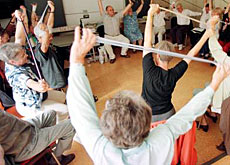Foreigners find Switzerland no place to grow old

As Switzerland’s population ages, the number of retired foreigners living in the country is also set to increase sharply.
Experts say lack of money is forcing many foreigners to stay on in Switzerland after retirement. In the light of this, the authorities are having to review their care provision.
According to the Federal Statistics Office, the number of foreign pensioners in Switzerland is expected to double – from 67,000 in 1997 to 123,000 in 2010.
“In the city of Bern the proportion of Swiss over 65 is around 19 per cent, while five per cent of the foreign population falls within that age group, “ said Daniel Slongo of the city administration.
“That doesn’t seem high, but more and more foreigners are getting to the age where they need social care.”
False assumptions
In the past the Swiss public perceived foreigners as either workers or young people but not as elderly people, said François Höpflinger, professor at the university institute of age and generation studies in Sion.
It was taken for granted that elderly guest workers would go back to their native country when they retired.
“This assumption was even made in cases where returning home was just not realistic,” he added.
Höpflinger explained that the situation of aged foreigners in Switzerland nowadays was very different. Many foreign workers stayed on after retirement although they were not well integrated and had language problems.
Money worries
Foreigners in the low-income bracket were most likely to remain after retiring, the academic said. The more prosperous tended to travel between their country of origin and the host country.
“The purchasing power of an old-age pension in Swiss francs does not allow pensioners to lead a carefree life in southern European countries where life has become more expensive and the infrastructure has deteriorated,” commented Höpflinger.
Guglielmo Grossi, Bern representative of the construction and industry trade union and a member of the city parliament, told swissinfo that aged foreigners staying in Switzerland had no choice but to integrate into the society from which they had always felt excluded.
“[They] have already given up their dream of returning to their native country but at the same time are no longer part of the workforce,” explained Grossi.
Lack of information
Foreign pensioners who were cut off from the local community because of language problems were often not properly informed about public services for the elderly, said Daniel Slongo.
“Many of them do not know that foreigners are also entitled to these services.”
Slongo said the home care association, Spitex, had recently started publishing brochures in several languages. The authorities were also insisting that Spitex employees could speak a number of languages.
François Höpflinger told swissinfo the first generation of elderly foreign migrants had poorer health than the corresponding Swiss age group, and predicted a further increase in the number of aged foreigners in the low-income bracket and with health problems.
“A stressful migration experience and a high workload have resulted in this formerly extremely healthy and young population group becoming a group of pensioners with below average health,” said the academic.
Revamping old people’s homes
Ueli Schwarzmann, director of old people homes in the city of Zurich, said it was high time the concept of old people’s homes was updated so as to take into account the needs of the new generation of ageing Swiss and foreign residents.
Old people’s homes were already planning to open wings for foreign residents, but there could be no question of “foreign ghettos”.
Schwarzmann added that the new concept he envisaged was for multifunctional old people’s homes, including day centres, which would welcome foreign residents.
In Bern, a group consisting of foreigners’ organisations and officials “is trying to find out how the special needs of aged foreigners and Swiss differ”, said the city’s Daniel Slongo.
“We will then decide where and how we can improve the quality of life for elderly residents.”
swissinfo
According to the Federal Statistics Office, most foreign pensioners in Switzerland are people who have been living here for a long time.
First-generation guest workers from southern Europe are worse off than those from northern or eastern European countries.
They are also less well integrated in linguistic and social terms.
The number of elderly foreigners in Switzerland is on the rise.
The majority of elderly foreign residents in Switzerland come from EU countries.
In future, the number from Balkan countries and Turkey is expected to grow faster. Elderly foreigners are twice as likely to suffer poverty as their Swiss counterparts.

In compliance with the JTI standards
More: SWI swissinfo.ch certified by the Journalism Trust Initiative









You can find an overview of ongoing debates with our journalists here . Please join us!
If you want to start a conversation about a topic raised in this article or want to report factual errors, email us at english@swissinfo.ch.